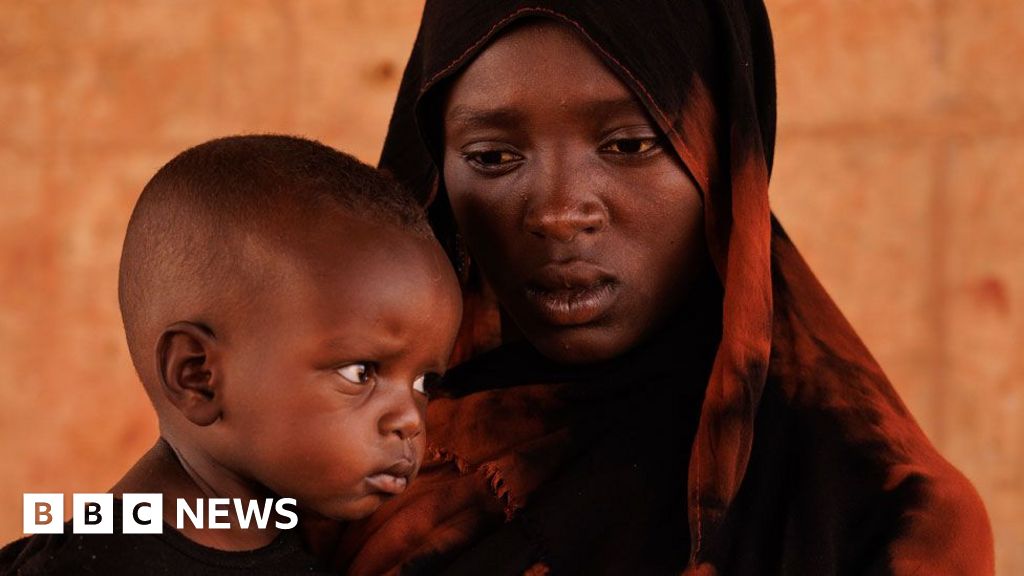
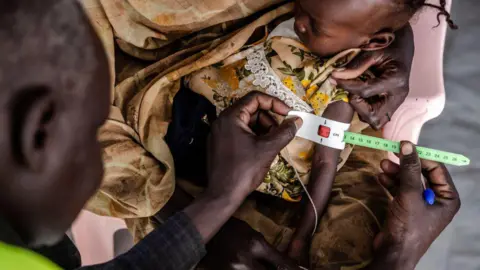 AFP
AFPFamine is ravaging Sudan.
The Sudanese Armed Forces (SAF) – which claims to be the government of Sudan – took a small step towards alleviating that famine earlier this week by allowing 15 UN aid lorries to cross the border from Chad to bring food to the starving.
Aid agencies hope that it opens the door to a full-scale relief effort that can save millions of lives.
But they fear it is just a symbolic concession – too little and too late.
Four weeks ago, the UN-accredited Integrated food security Phase Classification (IPC) system said that famine conditions existed in parts of Darfur, Sudan’s westernmost region.
This was no surprise.
Sudan’s humanitarian catastrophe has been the largest in the world for many months. More than half of Sudan’s 45 million people need urgent relief aid.
More than 12 million are displaced, including nearly two million refugees in neighbouring countries – Chad, Egypt, and South Sudan.
Some food security specialists fear that as many as 2.5 million people could die from hunger by the end of this year.
Starvation as a weapon
While the roots of Sudan’s hunger lie in decades of economic mismanagement, the legacy of devastating wars, and drought made worse by climate crisis the trigger for today’s famine is the use of starvation as a weapon.
War erupted in April last year between the SAF, under Gen Abdel Fattah al-Burhan, and the paramilitary Rapid Support Forces (RSF) led by Gen Mohamed Hamdan Dagolo, known as “Hemedti”.
The war soon devastated Sudanese communities.
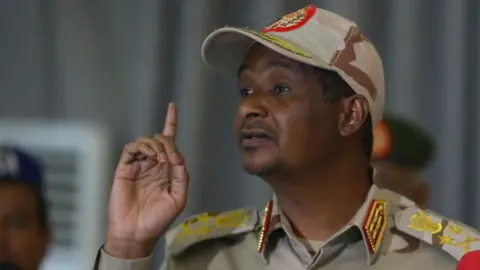 Getty Images
Getty ImagesLike a swarm of human locusts, RSF militiamen rampaged through the capital, Khartoum, stripping it bare of anything that could be pillaged and resold. The force also vandalised vital infrastructure such as hospitals and schools.
The same story was repeated wherever the RSF advanced.
The breadbasket regions of Gezira and Sennar along the Blue Nile, a place of vast irrigated farms, have been ravaged.
People there are going hungry for the first time in generations.
Starvation is worst in Darfur, especially in el-Fasher, the only city in the region still controlled by the army and its local allies.
Surrounded by the RSF, the city depends on precarious supply routes that cross the battle lines. It is in the Zamzam camp for displaced people near el-Fasher that the aid group Médecins sans Frontières (MSF) first reported famine levels of malnutrition.
For its part, the army has fallen back on its tried-and-tested strategy of cutting off rebel-held areas. Its logic is that if it can choke off external supplies, the RSF’s local supporters will become discontented and some of its units may defect.
That tactic worked well when it was fighting the long war in southern Sudan from 1983 to 2005. Its generals regret that they allowed the UN to send aid, which, they believe, sustained the rebellion for long enough to enable the southerners to claim their independence.
The SAF controls Port Sudan, the country’s only port and its major route for imports. Even more importantly, the United Nations recognises the SAF as the sovereign government.
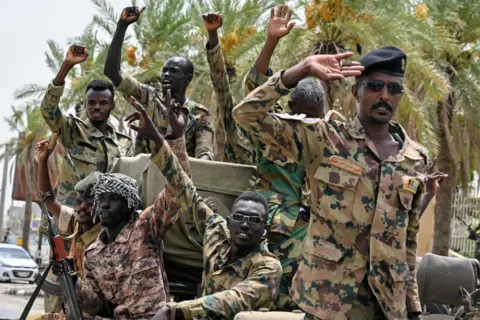 AFP
AFPEven though there are no SAF troops within 100 miles (160km) of the Chad border – which arms smugglers cross at will – the UN’s lawyers insist that World Food Programme lorries must have official government permission to drive the few miles from the Chadian border town of Adré along sand tracks into Darfur.
And the SAF has played the sovereignty card to maximum effect.
A mere trickle of aid
In June, Sudan’s ambassador to the United Nations, Al-Harith Idriss al-Harith Mohamed, condemned talk of starvation as a conspiracy by the country’s enemies to justify intervening.
He threatened “Biblical Armageddon” if the UN declared famine.
The IPC experts assessed the data, called his bluff, and declared famine.
The Sudanese Armed Forces backed down and opened the Adré border crossing – but only for three months.
And they allowed just 15 of the 131 UN aid trucks waiting at the border to cross, before insisting that negotiations begin on an inspection regime.
Aid veterans expect that the generals will use every trick in their bureaucratic book to slow down the approvals process.
And Darfur needs thousands of trucks of food every week, not a single convoy.
Getting food to Chad from the nearest ports on the West African coast takes weeks.
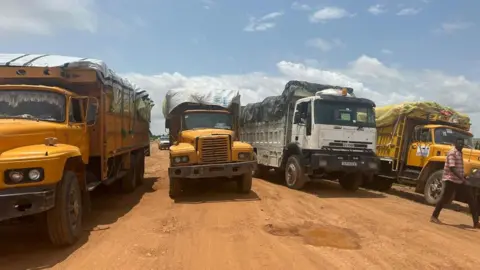 IOM / REUTERS
IOM / REUTERSTo feed the starving, every road needs to be opened – from Port Sudan, from South Sudan and across the desert from Libya and Egypt.
Sudan’s local relief committees also urgently need money.
A full-scale aid effort needs the warring parties to agree a ceasefire and to end pillage and extortion.
But there is no sign that they are willing to do this.
Backers jostle for regional clout
On Friday, peace talks in Geneva concluded without substantive progress. Hosted by Switzerland, they were jointly convened by the US and Saudi Arabia.
US Special Envoy Tom Perriello planned the meeting with high hopes. He wanted the two warring generals to meet face-to-face and sign a ceasefire.
But SAF head Gen al-Burhan refused to go or even send a senior delegation.
He argued that the RSF should first evacuate its forces from civilian neighbourhoods – essentially demanding their withdrawal from the territories they had captured – as a precondition for talking.
Mr Perriello scaled down his expectations and settled on proximity talks and phone calls – including from US Secretary of State Anthony Blinken – hoping to open roads for humanitarian access.
He achieved just enough to say that all was not lost, and that the talks would resume at an unspecified future date.
But diplomats know that no progress is likely until the two sides’ main backers – for the RSF, the United Arab Emirates, and for SAF, Saudi Arabia and Egypt – come to an understanding.
Until now, the rivalry between Saudi Arabia and the UAE over who should lead the region has stalemated peace efforts.
Although it denies it, evidence points to the UAE supporting the RSF with money and guns, while Saudi Arabia leans towards SAF.
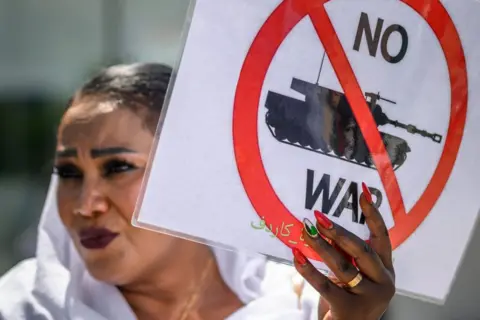 AFP
AFPThe UAE had not wanted to attend talks in the previous location of Jeddah in Saudi Arabia, expecting that any breakthrough would be credited to their Saudi rivals.
The Saudis, meanwhile, did not want to see the UAE deciding who would run Sudan’s next government.
Representatives from the two Arab states sat as observers in the Geneva talks. But until the top-level Arab decision-makers meet, that is just a diplomatic courtesy.
In the meantime, the fighting continues and the hunger deepens.
Sudanese are still hoping that, unlike previous civil wars that lasted years if not decades, this one can be brought to a swift and peaceful conclusion.
But the signs are not hopeful.
Alex de Waal is the executive director of the World Peace Foundation at the Fletcher School of Law and Diplomacy at Tufts University in the US.
More BBC stories about Sudan:
 Getty Images/BBC
Getty Images/BBC
